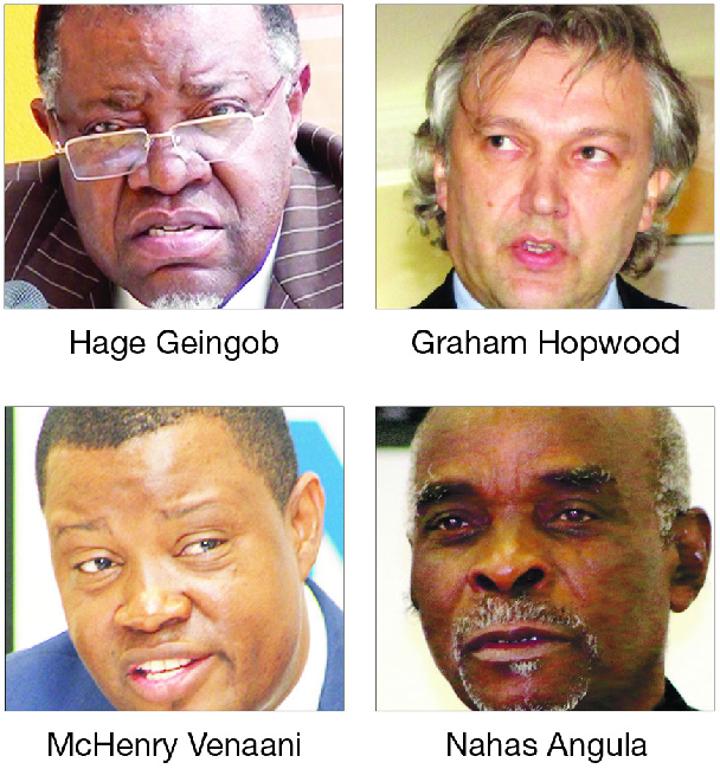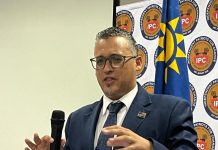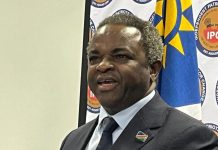Africa-Press – Namibia. INSTITUTE for Public Policy Research (IPPR) director Graham Hopwood has criticised the Electoral Commission of Namibian (ECN) for failing to take action against Swapo, which stands accused of benefiting from the Fishrot scandal.
This comes as Swapo secretary general Sophia Shaningwa resisted calls that the ruling party should pay back the money it had allegedly received from Fishcor through a governmental objectives fishing quota that has repeatedly been mentioned in an ongoing Fishrot bail hearing.
As damning evidence continued to be heard in the bail hearing of ex-minister of justice Sacky Shanghala, his business partner James Hatuikulipi, Pius Mwatelulo, former National Fishing Corporation of Namibia (Fishcor) chief executive officer Mike Nghipunya, Otneel Shuudifonya, and Phillipus Mwapopi, Shaningwa said she must be provided with the number of the account in which the money in question was paid.
“Swapo has an account name. Go back and ask them to provide an account in which they deposited that money.
“Every day I tell you the same story that Swapo did not receive money,” Shaningwa said.
Hopwood said the ECN seems to be neglecting its role in implementing the provisions of the Electoral Act which regulates political party financing while passing on such responsibility to institutions such as the Anti-Corruption Commission (ACC). He said the recent bail hearing revelations had proven that money seems to have flowed to the ruling party.
“At the moment you have a situation where the law is not being implemented and it has created an impression where political parties and political actors do what they want and it seems that the ECN is not comfortable with playing that role, and wants to pass the buck of holding Swapo to account to other institutions such as the ACC to play the role of monitoring political party finances. We are in a very unacceptable situation,” he said.
Popular Democratic Movement leader McHenry Venaani this week reiterated that Swapo must pay back the money it has allegedly received through Fishcor as part of the Fishrot scandal.
This comes as two versions have emerged in an ongoing bail hearing of how much money Swapo actually received from the Fishrot proceeds. The money is said to have been paid to Swapo by two law firms, Sisa Namandje & Co, and De Klerk, Horn and Coetzee (DHC) Inc.
On the one hand, Fishrot-accused former Fischcor chief executive Mike Nghipunya claims that fishing quota proceeds of more than N$81 million were paid to Swapo through the bank accounts of two law firms, while the state claims only about N$6 million reached the ruling party.
Venaani says lawyer Sisa Namandje is a person of interest in the matter. “The mere fact that he is outside and the prosecutor general says he complied with the law, is wrong. He is the elephant in the room in this case,” he says.
Venaani says the fact that Swapo is denying it has corruptly received N$6 million from Fishcor is not helping, since overwhelming evidence is linking the party to the proceeds of corruption.
He says instead of denying this, Swapo should have investigated how the money got into the party’s account. Venaani is accusing Swapo of violating the Electoral Act by not disclosing a donation of N$6 million.
“The next step is for Swapo to pay back what they got from the Fishrot,” Venaani says. AUDITORS TRACE PAYMENT TO SWAPO
Auditing firm Deloitte, which carried out a forensic investigation into the use of fishing quotas by the state-owned National Fishing Corporation of Namibia (Fishcor), stated in a report dated June 2021 that N$6 059 197 was paid from an account of the law firm De Klerk Horn Coetzee Incorporated (DHC) to Swapo.
With an amount of N$131 397 also paid to the party from an account of the company Celax Investment Number One, of which lawyer Marèn de Klerk of DHC was the sole director, a total amount of N$6,19 million was paid to Swapo from accounts of the company and law firm, Deloitte recorded in its report.
The state had disputed Nghipunya’s evidence that claim that fishing quota proceeds of more than N$81 million were paid to Swapo through the bank accounts of two law firms.
Repeated attempts to get comment from Namandje failed on Wednesday and yesterday. The Electoral Act requires all registered political parties and organisations to publicly disclose donations from local and foreign donors.
The specific provision regulating public donations states that: “Once every year, the political parties, organisations, members and persons … must in the prescribed manner submit to the commission details regarding all donations received by such entities or persons” not later than 60 days after the end of June.
Although this provision was passed in 2014, regulations guiding its implementation were gazetted for the first time at the end of last year only. These regulations limit public donations to political parties to N$4 million for local and N$2 million for foreign donors.
“A Namibian person or institution may not donate more than the prescribed amount in any financial year to a registered political party, registered organisation, member or other person,” the regulations read.
Although Swapo appears to have violated the act, the ECN is unlikely to take any action against the party, chief electoral officer Theo Mujoro yesterday said.
“It is too early for the ECN to comment on the matter as the court has not made a ruling yet,” he said. JUDGE MUST DECIDE
Swapo stalwart Nahas Angula earlier this week said the court should be allowed to rule on whether Swapo should pay back the money. “It’s for the judge to make a finding,” he said.
Angula said Swapo should not benefit from governmental objective quotas as that is “illegal”. “The act is there to support democracy. Now you go around and use public resources when you already receive funds from parliament. That’s illegal,” he said.
Angula said if the court finds that Swapo benefited from illegal proceeds, it would plunge the party into a crisis. Asked what governmental objective quotas are meant to be used for and whether Swapo was supposed to benefit from it, minister of fisheries and marine resources Derek Klazen referred The Namibian to his personal assistant Levilee Abrahams.
Abrahams said: “The court will determine whether that amount is a violation of the Marine Resources Act.” Namandje did not respond to The Namibian’s request for comment by the time of going to print.
For More News And Analysis About Namibia Follow Africa-Press






